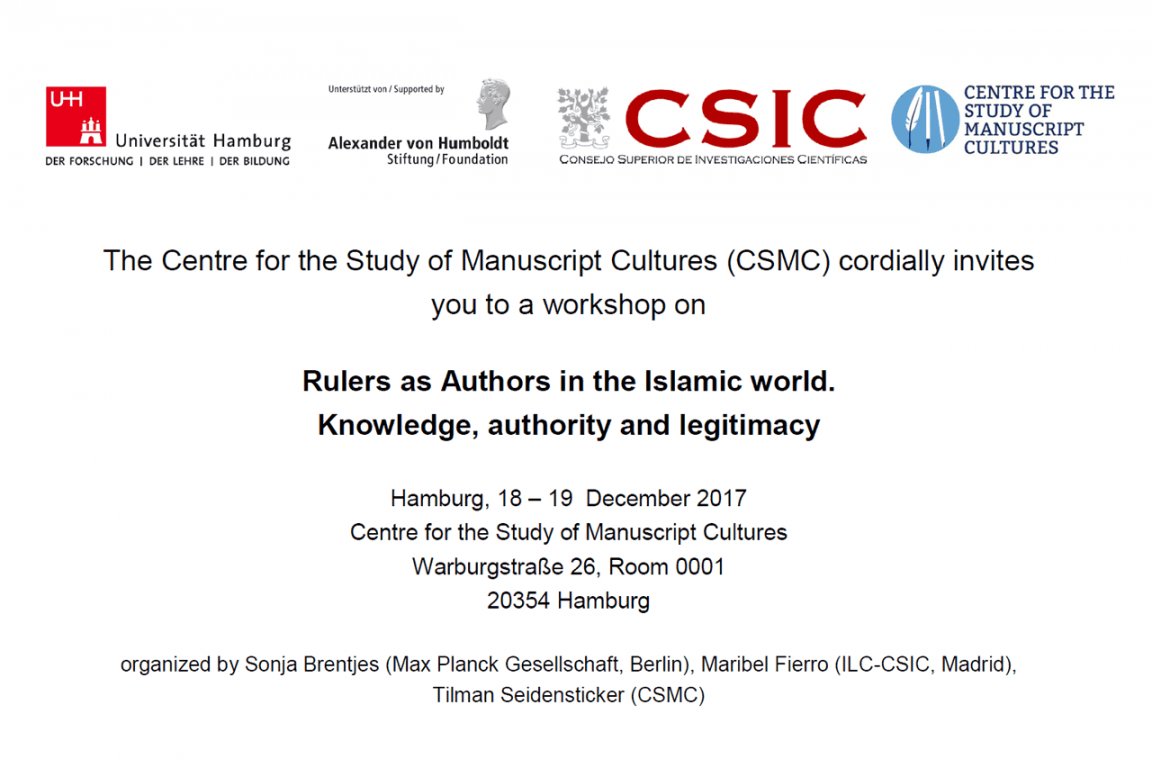Workshop: Rulers as Authors in the Islamic world

About The Event
The Centre for the Study of Manuscript Cultures (CSMC) cordially invites you to a workshop on “Rulers as Authors in the Islamic world: Knowledge, authority and legitimacy”.
Knowledge, authority and legitimacy
Date: December 18-19, 2017
Venue: Centre for the Study of Manuscript Cultures (CSMC), Warburgstraße 26, Hamburg, Germany
Organized by: Sonja Brentjes (Max Planck Gesellschaft, Berlin), Maribel Fierro (ILC-CSIC, Madrid), Tilman Seidensticker (CSMC)
Rulers could intervene in the production of literary texts indirectly as patrons but also directly as authors of such texts. The aims of the Workshop Rulers as authors in the Islamic world: knowledge, authority and legitimacy are to assess the geographical and chronological extension of the figure of the ruler as author, and the extent to which it reflects particular understandings of political and religious authority. Special attention will be paid to the manuscript tradition of the rulers’ writings. Nineteen contributions covering 1200 years will deal with all major political, religious, and military types of rulers that emerged in different Islamic societies in Asia, Africa and Europe.
Program
- I. The early period (1)
– Teresa Bernheimer (SOAS, London), ‘Ali b. Abi Talib and other imams.
– Adam Gaiser (The Florida State University), Eloquent Exchange: Asceticism and Shirā’ in the Poetry of Qaṭarī b. al-Fujā’a.
- I. The early period (2)
– Sean W. Anthony (Ohio State University), Authors of piety, poets of blasphemy: caliphal authorship in the construction of the Umayyad past.
– Letizia Osti (University of Milan), Monarchs, kuttāb, orators, epistolographers, land-tax officials, heads of bureaux. Abbasid rulers and their standing as authors.
- II. Caliphs, Imams and Messianic figures (1)
– Olly Akkermann (Freie Universität Berlin), The Bohras and the making of the Neo-Fatimid Library.
– María Luisa Ávila (CSIC-Granada) and Maribel Fierro (CSIC-Madrid), Do caliphs write? The cases of the Cordoban Umayyads, the Hammudids and the Mu’minids.
– Hasan Ansari (Institute for Advanced Study, Princeton), Imam al-Manṣūr bi-llāh ʿAbdullāh b. Ḥamza: A Zaydī ruler and author.
- II. Caliphs, Imams and Messianic figures (2)
– Murray Last (University College, London), How really ‘bookish’ were the Sokoto mujahidun?
– Ahmed Ibrahim Abushouk (Qatar University), The Pen and the Sword: The Case of the Sudanese Mahdi (1844-1885).
– Todd Lawson (University of Toronto), An Author as Ruler: The Bāb and his Qayyūm al-asmā’.
- III. Emirs and sultans (1)
– Maribel Fierro (CSIC), What and why non-caliphal rulers wrote in al-Andalus and the Maghrib.
– Petra Schmidl (Exzellenzcluster Normative Ordnungen, Goethe-Universität, Frankfurt), The Rasulids in Yemen and the science.
- III. Emirs and sultans (2)
– Anne-Marie Eddé (Université Paris 1), The qalam and the sword: the Ayyūbid princes as authors.
– Christian Mauder (Göttingen University), Legitimating Sultanic Rule in Arabic, Turkish and Persian– Late Mamluk Rulers as Authors of Religious Poetry.
- III. Emirs and sultans (3)
– David Durand-Guédy (Independent scholar), The Seljuks.
– Jürgen Paul (CSMC), Epigrammatic quatrains: Versifying Khwārazmshāhs.
- IV. The great empires: Timurids-Mughals, Ottomans, Safavids
– Matthew Melvin-Koushki (University of South Carolina), Timurid-Mughal Philosopher-Kings as Sultan-Scientists.
– A.T. Sen (Leiden University), A Scholar-Prince in Defiance of Ottoman Practice: The Politics of Şehzade Korkud’s Intellectual Output.
– Hani Khafipour (University of Southern California), Dreams of a Sufi King: Shah Tahmasb and Visions of the Sacred.
The Workshop is financed by Anneliese Maier Award 2014, Practicing knowledge in Islamic societies and their neighbors, IP Maribel Fierro (CSIC) Universität Hamburg – Centre for the Study of Manuscript Cultures (CSMC)
Participation is free of charge and visitors are welcome. Please register here.
Workshop program and abstracts can be found here.
Location
Centre for the Study of Manuscript Cultures


We're always eager to hear from you.
If you’d like to learn more about us or have a general comments and suggestions about the site, email us at